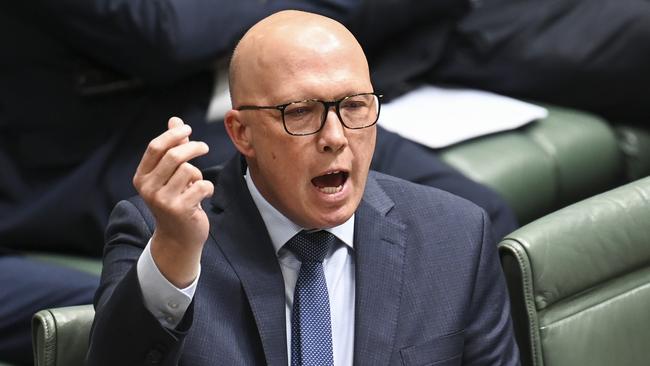
Cost of living remains the defining issue.
What happens over the next couple of months will have a profound impact on the federal election.
The first Newspoll of the year only reinforced the point that the electoral contest could still go either way.
But the Coalition is running out of time. How it responds will position both sides for the year ahead.
There is no question the first week of parliament was a good opening innings for Labor and Anthony Albanese, in the sense they have achieved key victories early.
The momentum, at least in the short term, is with Albanese.
The Prime Minister got what he wanted this week: support for his refashioned tax cuts and the passage of the final round of industrial relations laws.

But there is the politics and then there is the policy.
Albanese needed to come back in the new year much more focused and match fit after a demoralising end to 2023, the loss of the voice referendum and a mini-crisis over immigration detention.
This week he proved he was still a formidable politician.
Albanese met the benchmark required of him to reboot his own personal prospects and halt the deterioration of support that had become evident prior to Christmas.
But this was always a political yardstick beyond anything else.
Albanese and his government will now have to live with the longer-term policy consequences. Good or bad. And it could easily go bad.
If the conditions for an earlier election fail to materialise, the risk for Albanese into 2025 is that these two victories on tax and IR will have done little to address the key economic issues – cost of living and productivity.
The implication for the tax cuts is that they don’t kick in until the second half of the year.
Despite the bluster, people may come to realise they do nothing to resolve the immediate cost-of-living pressures and do only slightly more to compensate for the longer-term pain.
The IR legislation has the potential to cause a whole range of longer-term effects, many of which may prove detrimental and counterintuitive in the current economic conditions – particularly if one considers the alarming rate of small business (family-run) foreclosures.
So, while Albanese won the battle this week, the war is far from over. While Labor is getting its act together on the politics it has a longer-term policy challenge.
Its tax plan leaves bracket creep a highly contestable space for the next election. And it may find there is an expiry date to the politics if the Coalition can establish a beachhead on the issue of trust.
Yet the Coalition has challenges now on both fronts. It is under pressure on the politics and it is absent of policy.
The murmurs among backbenchers about the underperformance of the Coalition frontbench – with the exception of Peter Dutton – are also growing.
While this has been an issue for some time, it hasn’t really mattered until now.

What the Liberal leader has achieved, however, amid the noise of Labor’s parliamentary hubris, is the question of doubt over whether Labor has a hidden class-based agenda.
Albanese and his Treasurer, Jim Chalmers, willingly opened the door this week to a further shift to the left on economic policy and a return to the 2019 program on wealth tax – namely, a refusal to rule out changes to negative gearing.
While Labor may have been celebrating a tactical victory over the Coalition, the strategic environment is far more uncertain.
Albanese’s fleet-footed equivocation on this issue has given Dutton the ammunition for an offensive over negative gearing.
He was assisted on Friday morning by Treasury secretary Steven Kennedy, who refused to reveal before a Senate inquiry whether Treasury had been asked by Chalmers to work up options on negative gearing.
His non-denial denial could be legitimately interpreted as a yes.
It may have been a rough week for Dutton but he at least got something out of it, which may prove to be more valuable in the longer term politically than winning or losing the opening week of parliament.






Federal politics is now at a pivotal point in the election cycle.